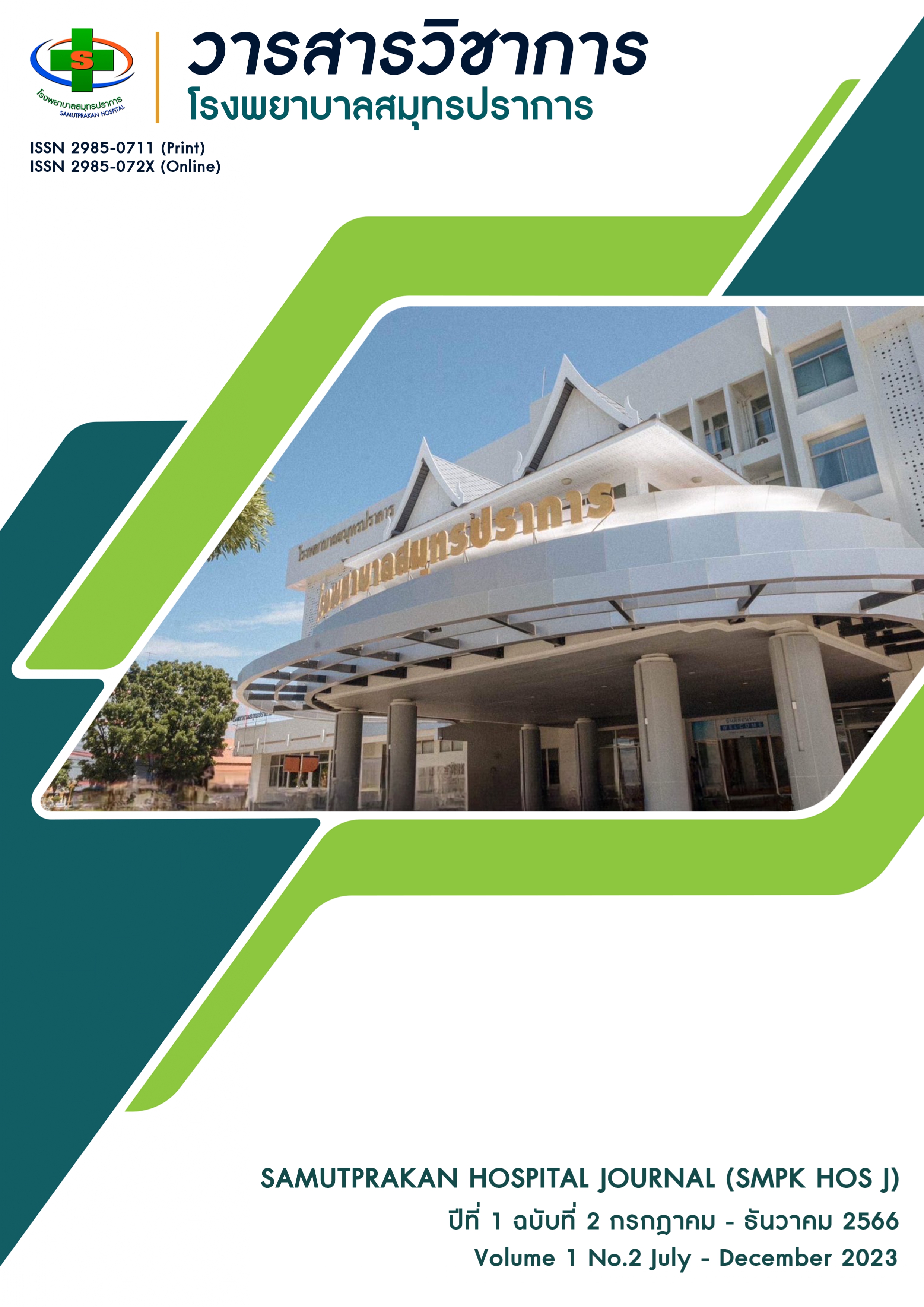Results from the Development of Sterilization Medical Equipment Supply System in Samutprakan Hospital
Keywords:
Central Sterile Supply Department, Sterile equipment disbursement system, Sterilization medical equipment supply system, Sterile equipmentAbstract
This study aims to develop and evaluate the sterile equipment disbursement system in the Central Sterile Supply Department (CSSD) at Samutprakarn Hospital. The satisfaction of both service providers and recipients as well as the risks involving the sterile equipment disbursement systems were assessed. There are 2 groups of samples, which were specifically randomized. The first group was CSSD officers who had been working for more than 6 months. The second group was 20 people and staff who have used the sterile equipment disbursement system for more than 6 months. Eighty-four participants were included in the study. The sterile equipment disbursement systems, the Questionnaire, and the sterile disbursement service record form were used as the tools and were validated for confidence by the entire Kronbach alpha coefficient of 0.920.
The results found that the most common disbursement problem was the dispensing of sterile devices in time for patient treatment. Therefore, the reimbursement of sterile equipment has been applied and the satisfaction of system users was assessed. The satisfaction of service users was high [providers =4.21 (S.D.=0.512), customer
=4.27 (S.D.=0.576)]. The incidence of risk of not being able to send equipment to service recipients in time for patient treatment decreased from 29 times in 2020 to only one time in 2023.
References
อะเคื้อ อุณหเลขกะ. ความรู้ในการทำลายเชื้อและการทำให้เครื่องมือแพทย์ปราศจากเชื้อ. พิมพ์ครั้งที่ 1. เชียงใหม่:บริษัท มิ่งเมืองนวรัตน์ จำกัด;2565.
ราตรี นาคกลัด. การพัฒนาระบบปฏิบัติการทำให้ปราศจากเชื้อโดยประยุกต์ใช้แนวคิดลีน [วิทยานิพนธ์ปริญญามหาบัณฑิต]. นนทบุรี: มหาวิทยาลัยสุโขทัยธรรมาธิราช, คณะพยาบาลศาสตร์, สาขาพยาบาลศาสตร์; 2559.
วิเศษ เติมใจ, สมศักดิ์ วสุวทิติกุล, นงนุชแย้มวงษ์, สายใจ ชอบงาม. ผลการประเมินการใช้เครื่องชี้วัดคุณภาพการทำปราศจากเชื้อในหน่วยงานเครื่องมือปลอดเชื้อ. กรุงเทพ: มหาวิทยาลัยศรีนครินทรวิโรฒ, คณะแพทย์ศาสตร์. ศูนย์การแพทย์สมเด็จพระเทพรัตนราชสุดาฯสยามบรมราชกุมารี; 2553.
ดวงพร พงษ์ศรีลา, พลอยนภัส ธนากุลธัญสิทธิ์, สมฤดี ชัชเวช. ผลของการรับ-ส่งอุปกรณ์เครื่องมือทางการแพทย์รูปแบบ Jet in Time งานจ่ายกลาง โรงพยาบาลตติยภูมิ. วารสารวิชาการแพทย์เขต 11. 2561;32(4):1383-1396.
Zeithaml VA, Parasuraman A, Berry, LL. Delivering Quality Service, New York: The Free Press; 1994.
ณัฏฐาสิริ ยิ่งรู้. ความสัมพันธ์ระหว่างสิ่งแวดล้อมในการทำงานและประสิทธิภาพการปฏิบัติงานของบุคลากรโรงพยาบาลพระนารายณ์มหาราช. วารสารการแพทย์โรงพยาบาลสิงบุรี. 2555;26(1):1-4.
Downloads
Published
How to Cite
Issue
Section
License
Copyright (c) 2023 Samutprakan Hospital Journal (SMPK HOS J)

This work is licensed under a Creative Commons Attribution-NonCommercial-NoDerivatives 4.0 International License.







